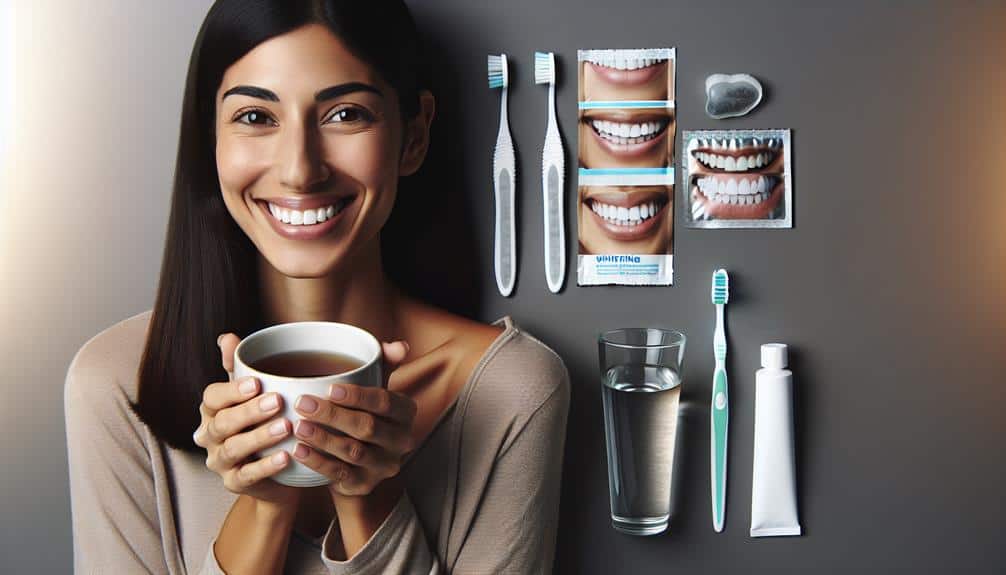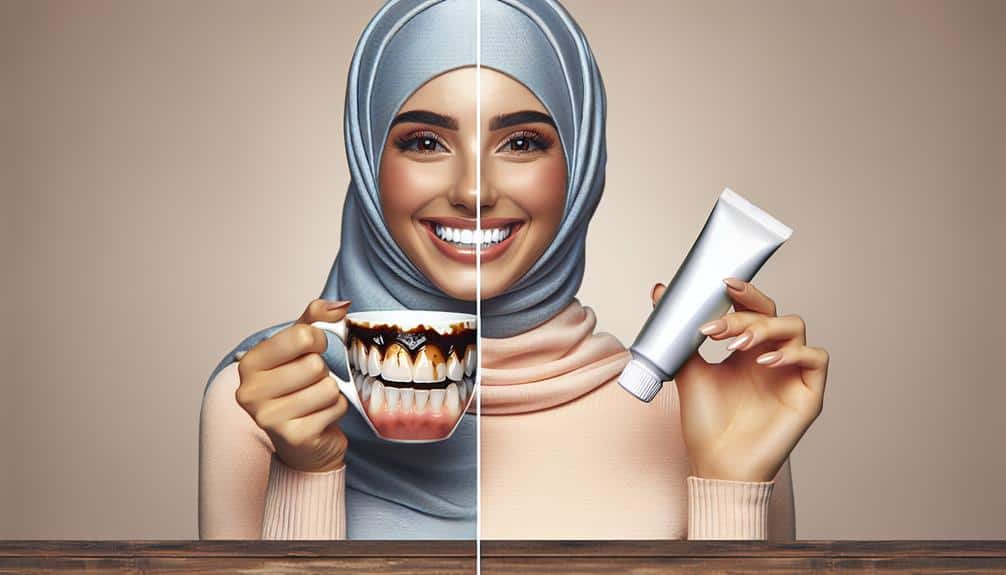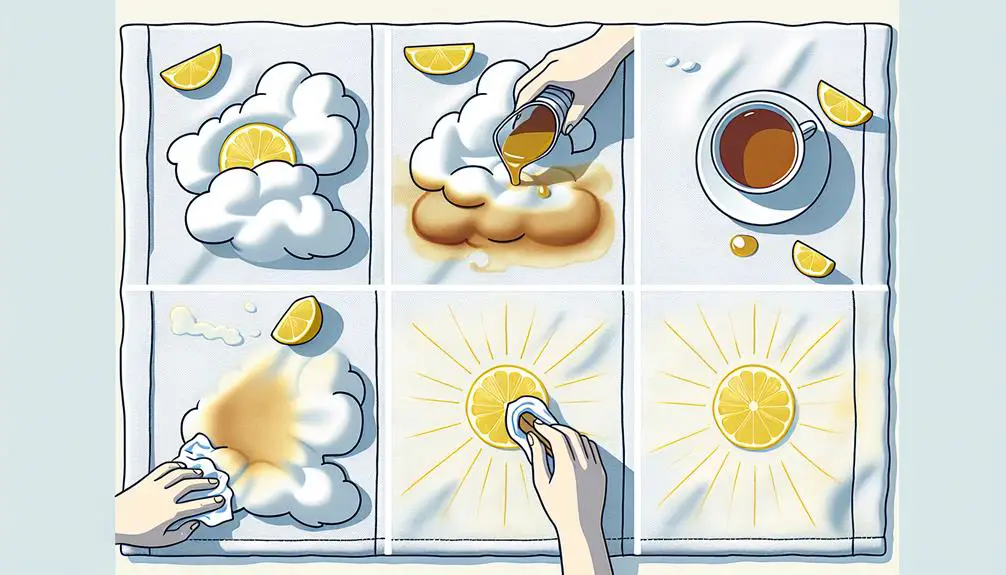To combat tea-stained teeth quickly, try natural remedies like baking soda, hydrogen peroxide, and herbal options. Whitening toothpaste with hydrogen peroxide can also help. Consider professional dental treatments such as teeth bleaching for stubborn stains. DIY techniques like using fruit peels cautiously as they contain natural acids. Prevention is key; brush daily with fluoride toothpaste, limit black tea consumption, and drink tea through a straw. These quick solutions can brighten your smile effectively. Further details on whitening techniques, professional treatments, and prevention can enhance your understanding of combating tea stains.
Key Points
- Use baking soda and hydrogen peroxide for natural teeth whitening.
- Consider herbal remedies like sage and thyme for whitening properties.
- Opt for whitening toothpaste and mouthwash with hydrogen peroxide.
- Explore professional dental treatments like teeth bleaching for stubborn stains.
- Practice good oral hygiene, limit black tea intake, and drink tea through a straw.
Natural Remedies for Tea-Stained Teeth
If you're looking to address tea-stained teeth naturally, consider incorporating simple yet effective remedies into your oral care routine. Herbal remedies have been used for centuries to promote oral health and whiten teeth. One popular option is using a mixture of baking soda and hydrogen peroxide as a natural teeth-whitening solution. Baking soda acts as a mild abrasive that can help scrub away surface stains, while hydrogen peroxide has bleaching properties that can lighten the color of your teeth.
Additionally, incorporating herbs like sage and thyme into your oral care routine can also provide benefits for tea-stained teeth. These herbs have natural whitening properties and can help freshen breath as well. Another approach is to explore tea alternatives that have less staining effects on teeth. Green tea, for example, contains fewer tannins compared to black tea, making it a gentler option for teeth staining.
Whitening Toothpaste and Mouthwash Options
Consider incorporating whitening toothpaste and mouthwash options into your oral care routine to help combat tea-stained teeth effectively. Whitening toothpaste contains abrasive particles or chemicals that work to remove surface stains on your teeth caused by tea consumption. Look for toothpaste that's recognized by dental associations and contains ingredients like hydrogen peroxide or carbamide peroxide, known for their teeth-whitening properties.
When choosing a whitening mouthwash, opt for one that contains hydrogen peroxide or fluoride to help lighten stains and strengthen enamel.
While these products can help improve the appearance of your teeth, it's crucial to manage expectations. Whitening toothpaste and mouthwash fall under cosmetic dentistry and are more effective for removing extrinsic stains. For deep-seated tea stains or significant discoloration, you may require professional dental treatments like enamel restoration procedures.
Incorporating whitening toothpaste and mouthwash into your daily routine can be a good preventive measure to maintain a brighter smile and support overall oral health.
Professional Dental Treatments for Tea Stains
In addressing deep-seated tea stains or significant discoloration, professional dental treatments offer effective solutions beyond whitening toothpaste and mouthwash options.
One common professional dental treatment for tea-stained teeth is teeth bleaching. This procedure involves using a bleaching agent to whiten the teeth, effectively removing stubborn tea stains and restoring a brighter smile. Teeth bleaching can be done in-office by a dentist or at home using custom-fit trays provided by the dental office.
Cosmetic dentistry also provides advanced treatments for tea-stained teeth. Procedures like dental veneers or crowns can effectively cover severely stained teeth, giving them a natural and brighter appearance. Dental bonding is another cosmetic dentistry option where a tooth-colored resin is applied to the teeth to cover stains and enhance the overall look of the smile.
When dealing with deep-seated tea stains, consulting a dentist who specializes in cosmetic dentistry can provide tailored solutions to effectively address the staining and help you achieve a whiter, brighter smile.
DIY Teeth-Whitening Techniques at Home
To enhance the whiteness of your teeth at home, try utilizing natural remedies like baking soda or hydrogen peroxide. Baking soda is a popular choice due to its mild abrasiveness, which can help scrub away surface stains on teeth. You can create a mixture by combining baking soda with a small amount of water and brushing your teeth with it gently. Another alternative is hydrogen peroxide, which has bleaching properties. It can be used as a mouthwash or mixed with baking soda to form a mixture for whitening.
Fruit peels, such as orange or lemon peels, contain natural acids like citric acid that may help whiten teeth. Rubbing the inside of the peel against your teeth for a few minutes before brushing can be beneficial. However, be cautious with fruit peels, as their acidic nature may erode tooth enamel if used excessively.
Tips for Preventing Tea Stains on Teeth
For individuals aiming to prevent tea stains on their teeth, incorporating daily brushing and regular dental check-ups can greatly reduce the likelihood of discoloration. Proper oral hygiene practices are essential in preventing tea stains. Brushing your teeth at least twice a day with a fluoride toothpaste helps remove plaque and surface stains caused by tea consumption. Remember to brush your teeth gently to avoid damaging the enamel. Additionally, consider using a whitening toothpaste to help prevent and reduce staining.
Dietary habits also play an important role in preventing tea stains on teeth. Avoiding excessive consumption of tea, especially black tea which is more likely to stain teeth, can help maintain a brighter smile. Drinking tea through a straw can also minimize contact between the tea and your teeth, reducing the risk of stains.
Regular dental check-ups are important for maintaining good oral health and addressing any potential issues early on. Your dentist can provide professional cleanings to remove stubborn stains and offer personalized advice on preventing tea stains based on your oral health needs. By combining proper oral hygiene practices, mindful dietary habits, and regular dental visits, you can effectively prevent tea stains on your teeth.
Frequently Asked Questions
Are There Any Specific Types of Tea That Are More Likely to Cause Stains on Teeth?
To start, various teas, like black tea, can stain teeth due to their tannins. Preventing stains involves rinsing your mouth after drinking and maintaining good oral hygiene. Remedies include professional whitening treatments or using whitening toothpaste.
Can Brushing Your Teeth Immediately After Drinking Tea Help Prevent Stains?
Brushing your teeth immediately after drinking tea is not recommended as the enamel may be softened by the tea's acidity. Instead, consider tea rinsing or using enamel protection toothpaste for effective tea stain prevention and best oral hygiene.
Are There Any Foods or Drinks That Can Help Reduce Tea Stains on Teeth?
Exploring tea alternatives and whitening foods can aid in reducing tea stains on teeth. Proper oral hygiene and prevention techniques are key. Remember, prevention is always better than cure when it comes to maintaining a bright smile.
How Long Does It Typically Take for Professional Dental Treatments to Remove Tea Stains?
To remove tea stains, professional dental treatments usually take a few sessions, depending on the severity. Tea stain prevention involves regular cleanings and avoiding prolonged tea exposure. Teeth whitening options like in-office bleaching can provide quicker results for stubborn stains.
Are There Any Specific Dental Products or Tools That Can Help Maintain Whiter Teeth After Using Natural Remedies or Professional Treatments for Tea-Stained Teeth?
Looking to maintain those pearly whites? Wondering if there are specific dental products or tools to keep your teeth white post-treatment? Keep an eye out for teeth whitening alternatives and natural remedies for effective maintenance tips.



